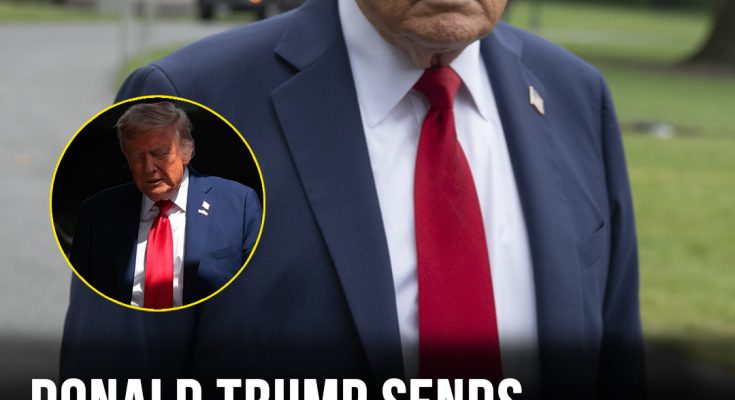
Donald Trump Alarms World Leaders with Early G7 Exit and Urgent Warning on Iran: “Everyone Should Immediately Evacuate Tehran”
June 16, 2025 — Former U.S. President Donald Trump caused widespread alarm on Monday after he departed the G7 Summit in Canada unexpectedly early and issued a cryptic, forceful message regarding Iran. His sudden exit and social media statements have intensified concerns over escalating tensions in the Middle East and raised serious questions about what actions the United States might be planning next.
The summit—hosted this year in Quebec—had been expected to focus heavily on the volatile situation unfolding between Iran and Israel, two nations now teetering on the brink of direct war. Just days before the G7 convened, Israel launched a surprise, large-scale strike targeting Iran’s nuclear enrichment facilities and military infrastructure. In retaliation, Iran fired a barrage of ballistic missiles at Tel Aviv, marking the most direct and dangerous military exchange between the two countries in recent years.
As world leaders gathered to address the crisis, Trump’s early departure caught many by surprise. The timing—and his remarks that followed—suggest that the situation behind the scenes may be even more urgent than previously believed.
“IRAN CANNOT HAVE A NUCLEAR WEAPON”
Shortly after boarding Air Force One to return to Washington, Trump took to his social media platform, Truth Social, to post a pointed and ominous message:
“Iran should have signed the ‘deal’ I told them to sign. What a shame, and waste of human life. Simply stated, IRAN CANNOT HAVE A NUCLEAR WEAPON. I said it over and over again! Everyone should immediately evacuate Tehran!”
The post immediately drew international attention. Analysts noted the language suggested that the former president, and potentially current U.S. officials, believe Iran is on the verge of either completing a nuclear weapon or triggering a catastrophic military response. The call for immediate evacuation of Tehran—a capital city of more than 9 million people—was interpreted by some as a potential warning of imminent military action or a large-scale escalation.
Trump’s statement further confirmed his long-standing opposition to Iran’s nuclear ambitions. Since the U.S. withdrawal from the Joint Comprehensive Plan of Action (JCPOA) in 2018 during his first term, Trump has pushed for a “tougher” deal to restrict Iran’s nuclear program and regional aggression. However, negotiations with Iran—under both Trump’s administration and subsequent ones—have stalled repeatedly.
His use of urgent, apocalyptic language sparked fears that diplomatic efforts have failed and that military confrontation could be just days—or hours—away.
Macron Claims Ceasefire Mediation; Trump Says “Much Bigger”
Adding to the confusion, French President Emmanuel Macron told reporters at a post-dinner press conference that Trump had left the G7 early to return to Washington and assist in mediating a potential ceasefire agreement between Israel and Iran.
“President Trump informed us that he was needed back in Washington to explore diplomatic solutions,” Macron said. “He expressed hope for de-escalation and a resolution to the conflict.”
But within hours, Trump contradicted Macron publicly in another scathing post on Truth Social:
“Publicity-seeking President Emmanuel Macron, of France, mistakenly said that I left the G7 Summit, in Canada, to go back to D.C. to work on a ‘cease fire’ between Israel and Iran. Wrong! He has no idea why I am now on my way to Washington, but it certainly has nothing to do with a Cease Fire. Much bigger than that. Whether purposely or not, Emmanuel always gets it wrong. Stay tuned!”
The cryptic nature of Trump’s “much bigger” claim has fueled rampant speculation across diplomatic circles, with many questioning whether the U.S. is preparing for direct military engagement or initiating covert operations in the region.

The Bigger Picture: A Region on the Edge
The latest Israeli strike reportedly damaged key centrifuge facilities used in uranium enrichment, and unconfirmed intelligence suggests that some of the targeted sites may have been previously unknown to international monitors. In response, Iran has vowed to retaliate “without limits,” and mass protests have erupted across the country.
U.S. intelligence sources have also reported that Iranian-backed militias in Iraq, Syria, and Lebanon are mobilizing, prompting increased military alerts at American embassies and bases across the region.
All of this has escalated fears that the longstanding “shadow war” between Iran and Israel may now explode into full-scale regional conflict—one that could draw in the United States, Saudi Arabia, and possibly even Russia or China.
White House Attempts to Calm Concerns
In Washington, White House Press Secretary Karoline Leavitt attempted to downplay concerns, releasing a statement on Twitter and to select media outlets, including BBC News:
“Much was accomplished at this year’s G7, but due to urgent developments in the Middle East, President Trump departed early after a productive dinner with Heads of State. The President continues to monitor the situation closely and is in direct communication with key allies.”
However, behind the scenes, officials appear less calm. Sources within the Pentagon and State Department have reportedly been put on high alert, with increased activity noted at several military installations, including CENTCOM headquarters in Florida and U.S. bases in the Persian Gulf.
Meanwhile, NATO officials have called emergency meetings, and the United Nations Security Council is expected to convene within 24 hours to address the crisis.
What Comes Next?
The world now watches with growing anxiety. Trump’s warnings, combined with Iran’s retaliatory missile strikes, have pushed the region closer to war than at any time since the U.S. assassination of Iranian General Qassem Soleimani in 2020.
With little clarity on the U.S. administration’s next move, and conflicting narratives from world leaders, uncertainty reigns.
Whether Trump’s dire warnings were a bluff, a call for last-minute diplomacy, or a signal of imminent U.S. military action, remains to be seen. But one thing is clear: The stakes have never been higher. As nuclear fears rise and war drums beat louder, the international community is bracing for what may come next.



